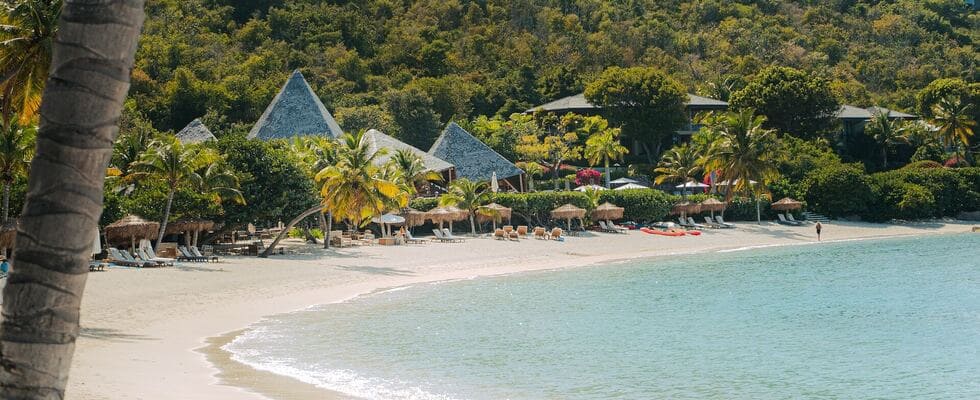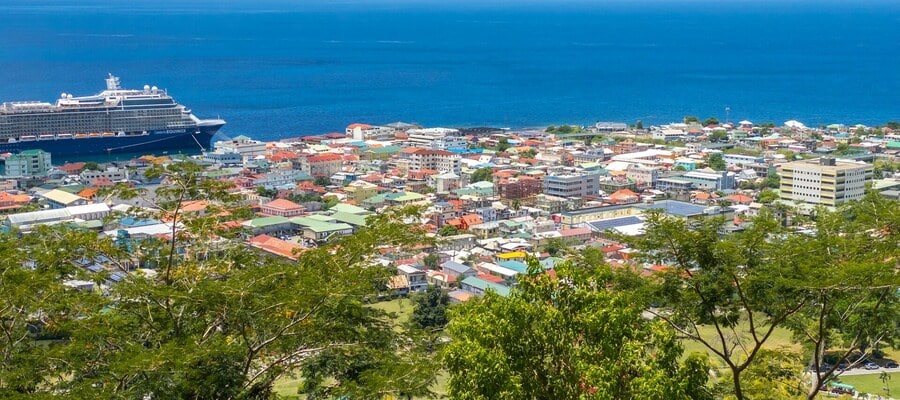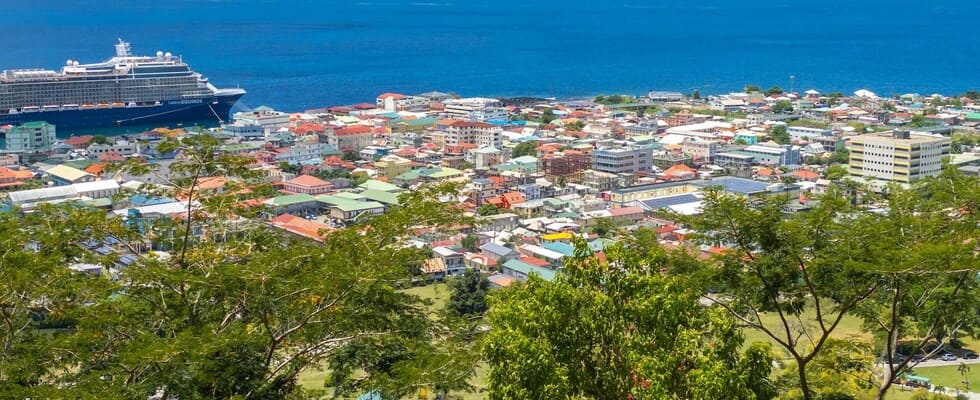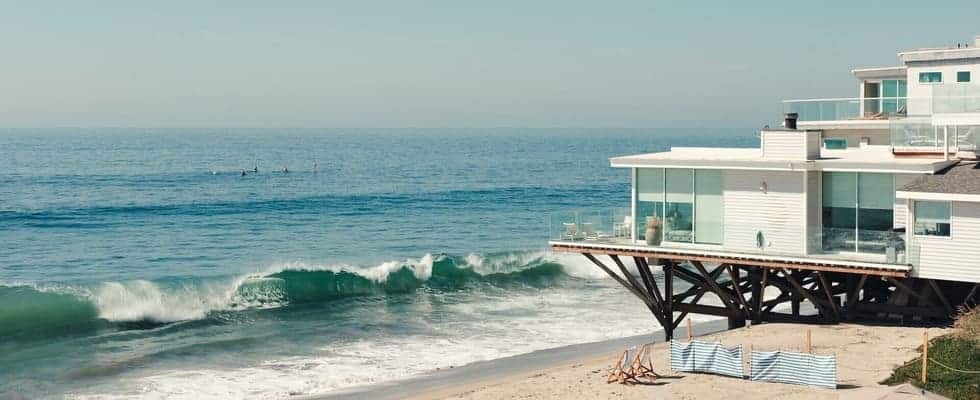Buying property in the Caribbean is an attractive option for many investors. The region boasts year-round sunshine and a tropical climate, a bustling tourist market, and the options to obtain residency for foreign property buyers. This guide will provide insight into the following:
The Caribbean Property Market
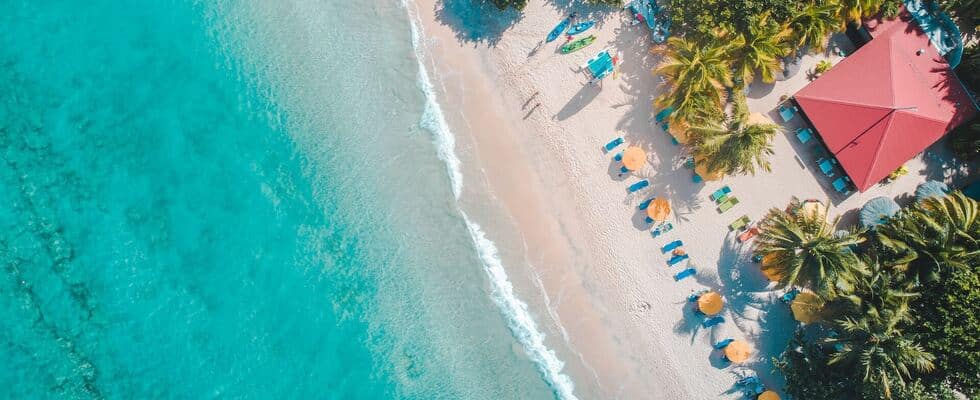
The Caribbean real estate market differs across the region. While most locations have no restrictions on foreign nationals owning real estate, some may require you to obtain an Alien Landholding License (also known as a foreign land ownership license). Five Caribbean islands – Antigua and Barbuda, Dominica, Grenada, St Kitts and Nevis, and St Lucia – offer citizenship through investment programs that allow foreign buyers to obtain second citizenship by making a Caribbean real estate investment.
According to Statista, the value of residential real estate in the Caribbean is projected to grow from $1.77 trillion in 2025 to $2.28 trillion by 2029, demonstrating the Caribbean’s appeal to foreign investors.
With increasing direct flights from key destinations, the growing tourism industry has seen the new construction of boutique resorts and short-term rental accommodation increase significantly. Pairing the financial benefits with the opportunity to obtain citizenship for foreigners who purchase real estate is set to see the market grow further.
Caribbean Real Estate Buying Process
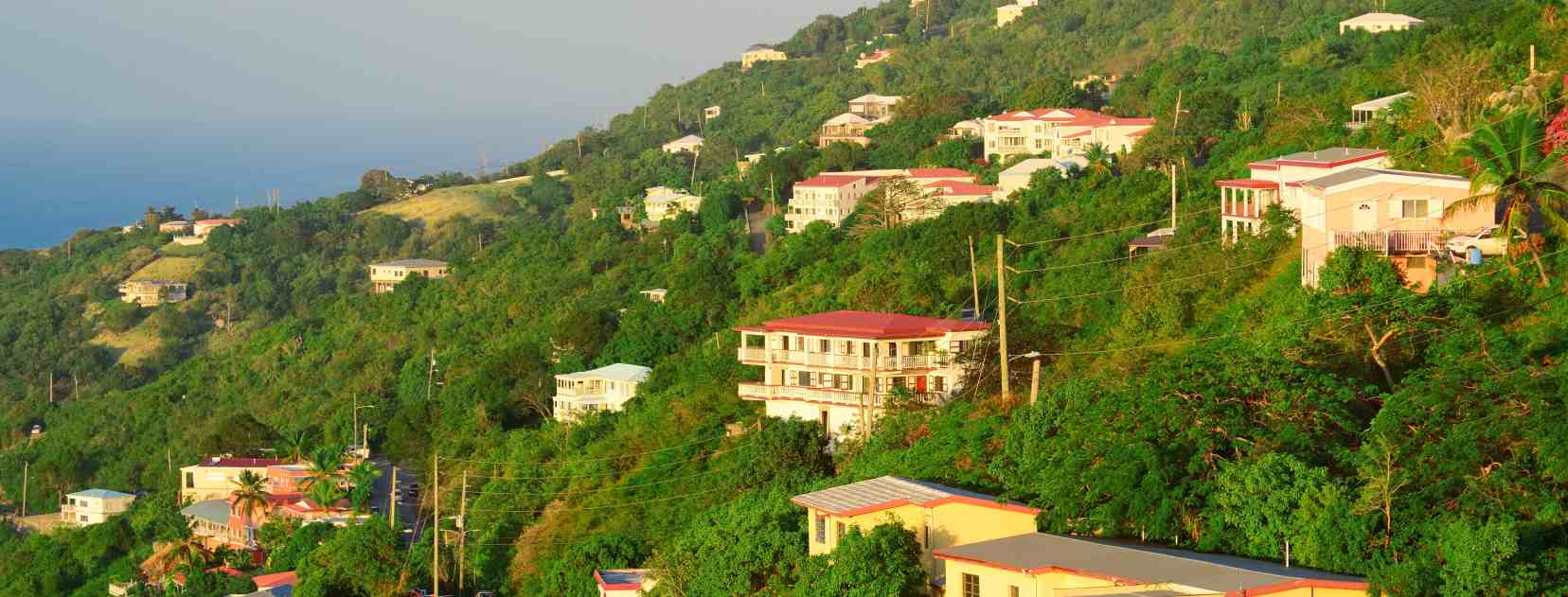
Each Caribbean country has its own legislation for buying property as a foreigner. For example, the buying process in some of the best islands to buy property in the Caribbean, like Antigua, Barbados, and St Lucia, is influenced by British law as former British Overseas Territories. However, the buying process in French Caribbean islands such as St Barts, St Martin, and Martinique is not influenced by English law but by general procedures practiced in France.
Generally speaking, you can expect to go through the following process as a foreign buyer:
- Obtain an Alien Landholding License
- Conclude an agreement on the property reservation
- The buyer puts down a deposit of 10 to 15 percent of the property price
- A Sale and Purchase Agreement is drawn up
- All contracts are signed in front of a notary, and the remainder of the funds are paid
- The property is registered with the local land department
Pros and Cons of Buying Property in the Caribbean

Pros
Affordability: Islands like Dominica, the Dominican Republic, and Grenada have low-cost real estate. The Dominica real estate market offers three-bedroom houses for under $100,000.
Tourism industry: The Caribbean is popular destination for tourism It’s thriving tourism industry provides ample opportunity for investors to earn high rental yield. Many approved Antigua real estate options are in lucrative tourism developments.
Citizenship: Buying the perfect property in the Caribbean can be a route to citizenship by investment. Qualifying St Kitts and Nevis real estate purchases include private homes and luxury condos, and investors gain second citizenship.
Low taxes: Many Caribbean countries do not impose Caribbean taxes on income or annual property tax. Additionally, foreign owners avoid wealth, inheritance, and capital gains tax.
Cons
Natural disasters: The Caribbean is prone to natural disasters, such as earthquakes, hurricanes, and volcanic eruptions. Hurricane season especially is an important factor for foreign ownership as it can result in property damage and unexpected repair costs.
Limited financing: Securing mortgages and other financing for buying Caribbean property is typically challenging.
Tourism dependency: Though the Caribbean’s real estate market is growing, it is largely dependent on tourism growth, which has proven to be vulnerable to global events like the Covid-19 Pandemic.
High living costs: Caribbean islands like Barbados, the Bahamas, the US Virgin Islands, and the Cayman Islands are in high demand among foreign nationals, but their costs of living are high.
Caribbean Property Prices

The cost of property in the Caribbean will depend on several factors: The type of property (apartment, condo, luxury villa, family home), its size, and its location. Some Caribbean islands are more expensive than other Caribbean islands, and property prices tend to be more affordable the further away you move from the city center.
Beachfront luxury properties in popular destinations can cost anywhere from $1 million to over $20 million. Mid-range condos and villas tend to go for between $300,000 and $800,000. Affordable options are plentiful, with the cheap Caribbean house for sale listed for as little as $80,000.
Top islands
The Bahamas: Luxury homes in Nassau and Paradise Island in the Bahamas cost $2 million to $10 million.
St Kitts and Nevis: Large four-bedroom villas to qualify for St Kitts and Nevis citizenship by investment start at about $600,000.
Turks and Caicos: Beachfront villas in Providenciales cost upward of $5 million, whereas beachfront property in North Caicos starts at about $ million.
Cayman Islands: A beachfront home in Rum Point, Grand Cayman, will command a price of around $3 million or more.
Dominican Republic: Popular tourist destinations like Punta Cana off beachfront condos from as little as $200,000.
Caribbean Taxes When Buying Real Estate

The specific Caribbean taxes and fees associated with buying Caribbean real estate will vary depending on the country in which the property is located.
Stamp duty: The stamp duty rate varies depending on the island and the property’s value, generally ranging between zero and four percent.
Income tax: If you intend to rent out your property, you will likely be charged income tax on the rental income earned. Of course, the rate will vary depending on the Caribbean island and the amount of rental income earned. For example, there are no Antigua taxes on rental income.
Capital gains tax: Caribbean property sales are liable for capital gains tax. The rates and amount of profit earned vary across the Caribbean islands. However, St Kitts and Nevis taxes do not include capital gains tax.
Annual property tax: Most Caribbean islands levy annual property taxes. The specific amount will be based on the value of the property and the local property tax rates, which generally range from 0.002 percent to five percent. For example, annual Grenada taxes on property are between 0.2 to 0.5 percent.
Country | ALHL Cost | Stamp Duty | Other Taxes | Minimum Investment Under CBI Program |
Antigua & Barbuda | 5 percent | 2.5 percent | – | $300,000 |
Dominica | 10 percent | 1 percent | 10 percent transfer tax (properties over $7,500) | $200,000 |
Grenada | 10 percent | 4 percent | 3.5 percent | $270,000 |
St Kitts & Nevis | 10 percent | – | 0.2 percent | $325,000 |
St Lucia | $2,300 – $4,200 depending on site area | 2 percent | – | $300,000 |
Caribbean Cost Calculator
Calculate the cost of Caribbean citizenship for you and your family, including all associated fees
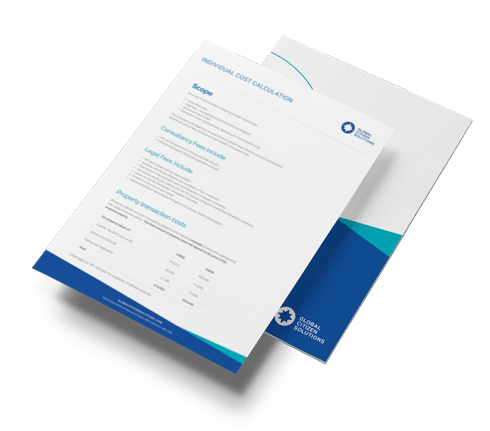
Caribbean Real Estate – What options are available?
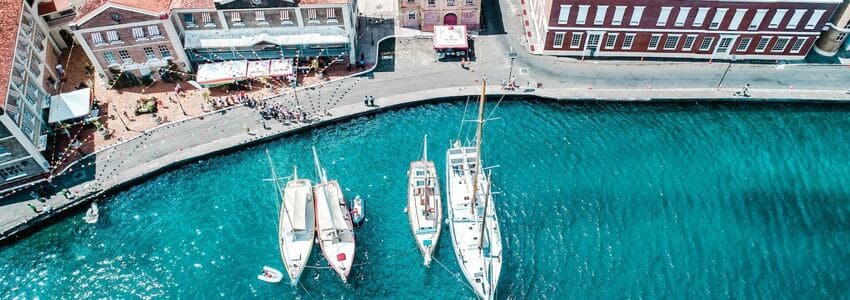
Beachfront villas: A luxurious beachfront villa located right on the golden sands of one of the most beautiful beaches in the world may sound too good to be true, but not in the Caribbean. Waterfront real estate with breathtaking ocean views and private access to the beach is widely available.
Condominiums: This type of Caribbean home is generally found in high-rise buildings and can range from simple, affordable condos to luxurious, high-end condos with a view of the Caribbean Sea.
Luxury homes: Many homes for sale in the Caribbean comprise luxury real estate. These properties are typically larger, with modern, high-end finishes and amenities such as private pools, tennis courts, and ocean views. They take the form of luxury villas, boutique hotels, private island retreats, luxury estates, and more.
Commercial properties: These can include hotels, resorts, and commercial spaces such as restaurants, shops, and offices. A particularly good option for those looking to make a business or real estate investment under one of the Caribbean citizenship by investment programs.
Land: Foreigners can buy undeveloped land for real estate development. These plots can be used to build a dream home or commercial property.
What is the cheapest island to buy Caribbean real estate?
The best Caribbean islands to find affordable properties in are St Vincent and the Grenadines, the Dominican Republic, and Dominica, without compromising the value you can get for your money. For example, the price per square meter to purchase an apartment in Dominica and the Dominican Republic can range between $1,000 and $1,500.
If you are buying property in the Caribbean as part of a citizenship by investment program, Dominica is the cheapest island. You can obtain Dominica citizenship by investment with a $200,000 real estate investment.
Managing Your Caribbean Property Investment
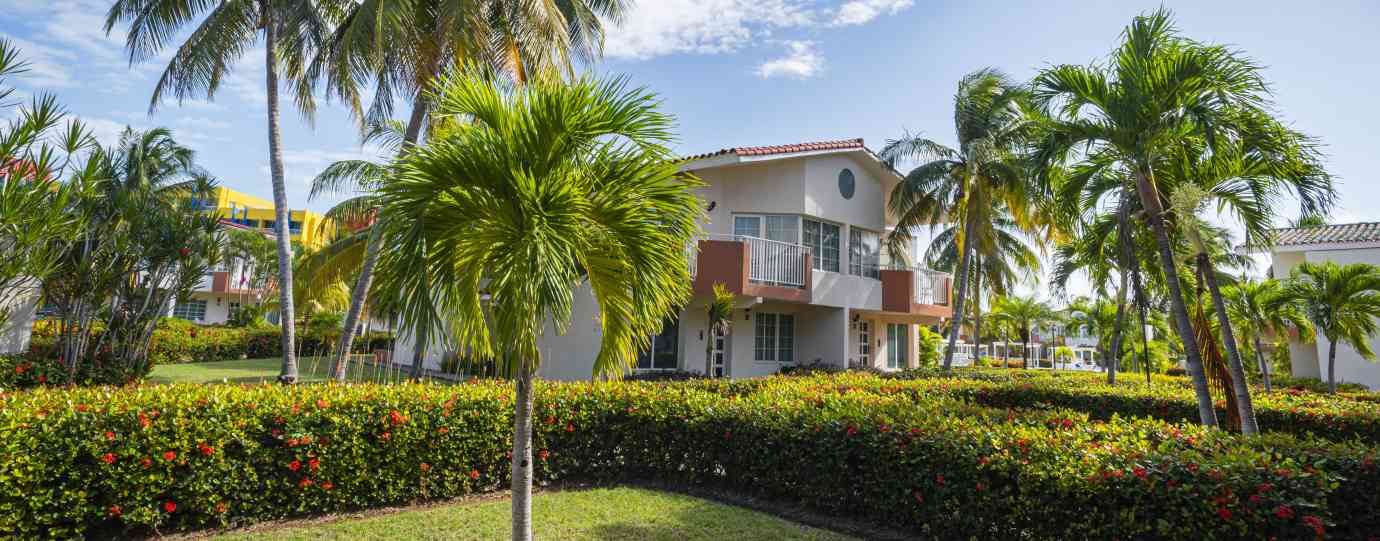
Managing a Caribbean property in the Caribbean requires planning to make it profitable and valuable. With the tropical climate, regular maintenance is a must to protect against humidity, salt corrosion, and hurricane damage, so a reliable property management service and property insurance are a smart investment.
If you’re renting out the property, using local vacation rental agencies or online platforms will help maximize occupancy, especially during peak seasons. Know the local property laws, tax obligations, and foreign ownership restrictions to avoid legal headaches.
Get comprehensive insurance for hurricanes and natural disasters. Overseas owners should hire a local manager to oversee operations, maintenance, and guest services, making life easier and increasing rental income. Properly managing a Caribbean property will keep it a valuable asset, minimize risks, and maximize returns.
Moving to the Caribbean through Real Estate Investment
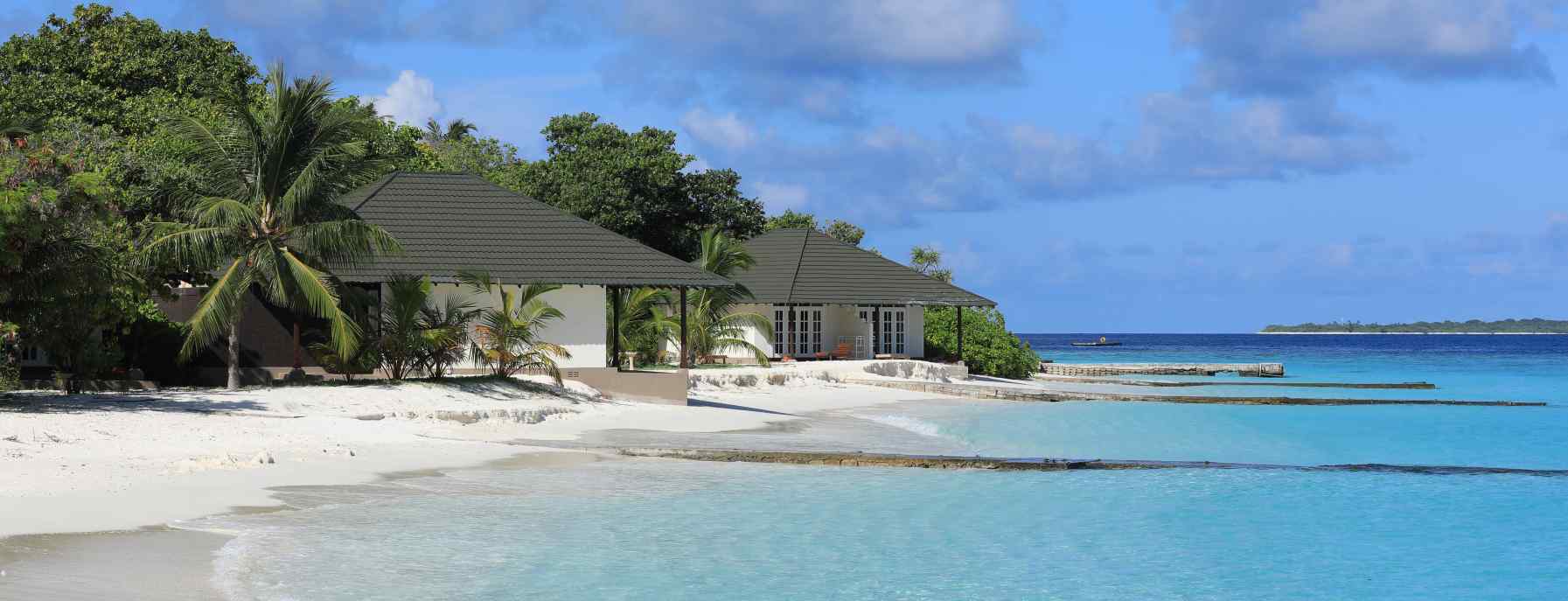
Citizenship by investment
Five Caribbean countries offer programs to invest in the Caribbean through real estate and obtain citizenship: Antigua and Barbuda, Dominica, Grenada, St Kitts and Nevis, and St Lucia. Each country has a different minimum investment and property option.
- Antigua and Barbuda: $300,000 real estate shares investment.
- Dominica: $200,000 real estate shares investment.
- Grenada: $270,000 real estate shares investment or $350,000 sole real estate purchase.
- St Kitts and Nevis: $325,000 real estate shares investment or $600,000 purchase of a private home.
- St Lucia: $300,000 real estate shares investment.
Residency by investment
- Anguilla: Five years residency for a real estate investment worth at least $750,000.
- The Bahamas: Permanent residency for a real estate investment worth at least $1 million.
- Cayman Islands: Permanent residency for a real estate investment worth at least $1.2 million.
- Curaçao: Three-year residence visa for a real estate investment worth at least $280,000.
- Montserrat: Permanent residency for a real estate investment worth at least $150,000.
- Colombia (San Andrés): Three-year residence visa for a real estate investment worth at least $200,000.
Why work with Global Citizen Solutions?

- Global approach by local experts. We are corporate members of the Investment Migration Council, with local expertise in all five Caribbean citizenship programs.
- 100 percent approval rate. We have never had a case rejected and will offer you an initial free-of-charge due diligence assessment before signing any contract.
- Independent service and full transparency. We will present to you all the investment options available, and all expenses will be discussed in advance, with no hidden fees.
- An all-encompassing solution. A multidisciplinary team of immigration lawyers, investment specialists, and tax experts will take into consideration all your and your family's mobility, tax, and lifestyle needs.
- Confidential service and secure data management. All private data is stored within a GDPR-compliant database on a secure SSL-encrypted server.
Get in touch with a Caribbean Citizenship by Investment specialist
Frequently Asked Questions about Buying Property in the Caribbean
There are no restrictions on foreign property ownership in the Caribbean. Apart from some limitations on property types and owning property in specific locations such as military zones, foreign nationals are free to buy real estate in the Caribbean. The buying process requires obtaining an Alien Landholding License (ALHL).
US citizens can buy property in the Caribbean. The Caribbean welcomes foreign property ownership, but you should check whether your chosen area has specific restrictions or bureaucratic procedures.
Most Caribbean islands require foreigners to apply for an Alien Landholding License (ALHL) to buy property. Foreign buyers can bypass the ALHL requirement by investing in property through a Caribbean passport by investment program in Antigua and Barbuda, Dominica, Grenada, St Kitts and Nevis, or St Lucia.
Costs to buy Caribbean property include stamp duty, agent fees, lawyer fees, transfer tax, and transfer fees. If you do not purchase property as part of a citizenship by investment program, you will need to obtain an Alien Landholding License (ALHL) as a foreign buyer, which can cost between five percent and ten percent of the purchase price.
St Lucia, Dominica, or the Dominican Republic come to mind as the best Caribbean island to buy property due to offering some of the Cheap Caribbean real estate prices. Countries like Antigua and Barbuda, Grenada, and St Kitts and Nevis offer citizenship through property investment.
St Barts, the British Virgin Islands, and the Turks and Caicos Islands are considered some of the safest places to buy property in the Caribbean due to their low crime rates, political stability, and stable property markets. Ultimately, the best Caribbean country for property investment will depend on your needs.
Buying property in Caribbean islands can be worth. While real estate prices in the Caribbean vary, some of the cheapest islands to purchase property in the Caribbean present lucrative opportunities to generate income. There’s also the opportunity to obtain second citizenship when buying real estate in the Caribbean through a citizenship program programs, which offers the benefit of access to Caribbean passport visa free countries.
There are generous tax incentives for property owners in the Caribbean. For example, many islands do not levy income, capital gains, or inheritance taxes.
A major risk of investing in real estate in the Caribbean is the weather. The Caribbean is a tropical paradise that can experience natural disasters such as hurricanes and earthquakes. Additionally, beachfront properties may be at risk of the affects of climate change, such as rising sea levels.
The Cayman Islands is a Caribbean island nation with no property tax.
While Jamaican real estate isn’t the cheapest option in the Caribbean, land lots are affordable, and the development of a luxury home in a popular tourist location can be a good investment, with a yield of up to 60 percent in five years.
Some of the cheapest islands in the Caribbean to buy property are Dominica, St Lucia, and the Dominican Republic. Buying land in the Caribbean is also an option to buy own cheap property.
Many Caribbean islands are focusing on sustainable development practices in real estate, which may be a consideration for some residential properties or vacation homes. Certain islands prohibit foreigners and citizens from owning property or land in protected areas. However, specific environmental regulations will depend on the island.
Many Caribbean islands are safe to buy property. Some islands with the low crime ratees that a popular among foreign real estate investors are Antigua and Barbuda, the British Virgin Islands, St Barts, and the US Virgin Islands.

